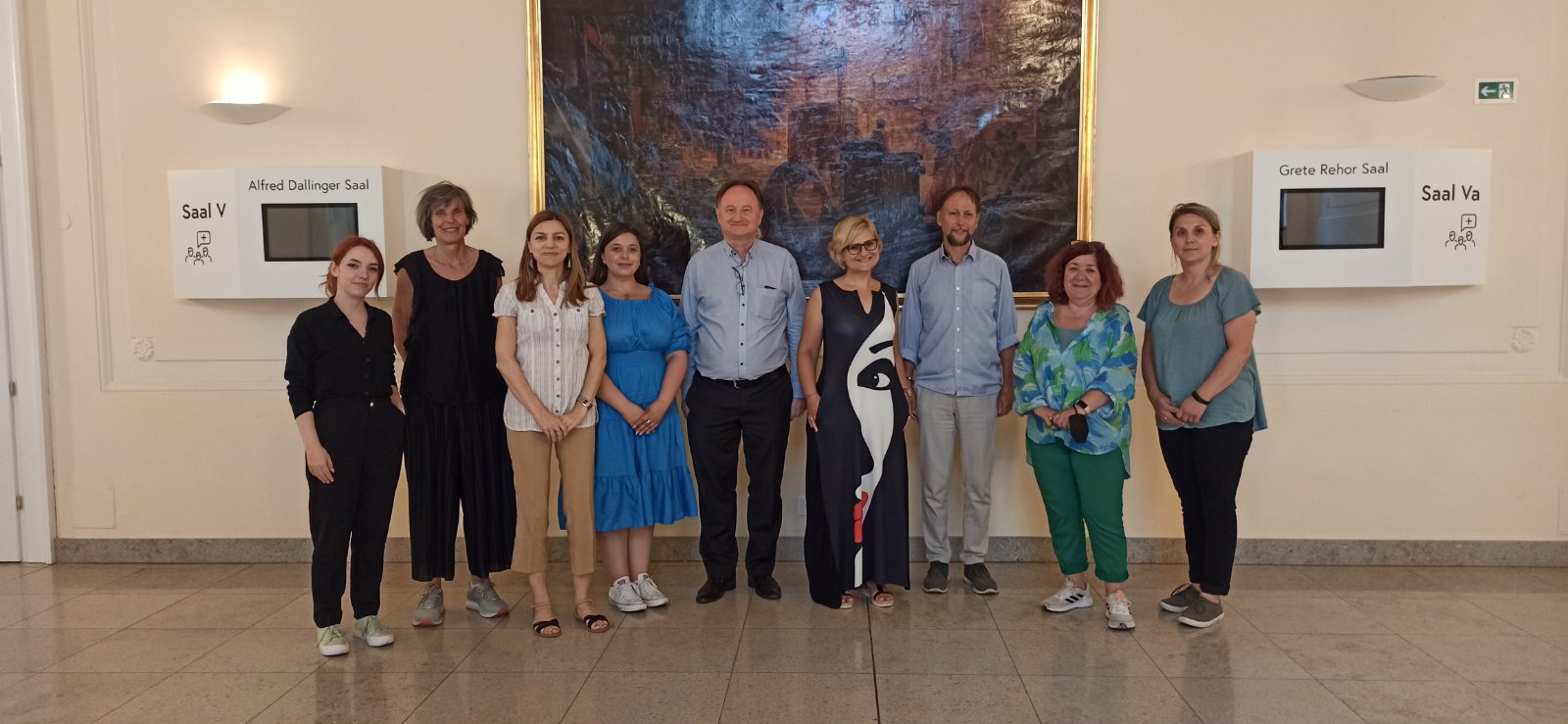Во периодот од 4 до 7 јули 2022 година во рамките на „Пилот-проект за Систем за рано предупредување за исчезнати деца“, спроведуван од Новинари за човекови права и управуван од партнер организацијата ЕКПАТ-Австрија, беше спроведена втората студиска посета за размена на искуства за претставници од НВо и медиумите од земјава.
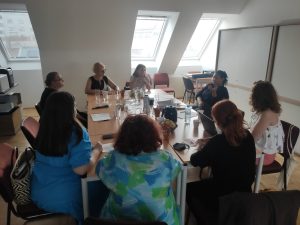 Студиската група во состав: Александра Радевска – претставник на Новинари за човекови права, НВО претставниците Маја Ацевска од Кризен центар „Надеж“, Андреа Накова од „Скриениот херој во секое дете“, Александра Ефремовска од Центар за социјални иницијативи „Надеж“, и новинарите Маја Данковиќ Баткоска од радио „Лидер“ и Бјанка Станковиќ од мултимедијалната платформа „Види Вака“, имаше можност да се запознае со институционалната страна социјалниот систем во Австрија, со работата на невладините организации во областа на правата на децата, поддршката на деца жртви на трговија со луѓе, како и со работата на медиумите на овие теми.
Студиската група во состав: Александра Радевска – претставник на Новинари за човекови права, НВО претставниците Маја Ацевска од Кризен центар „Надеж“, Андреа Накова од „Скриениот херој во секое дете“, Александра Ефремовска од Центар за социјални иницијативи „Надеж“, и новинарите Маја Данковиќ Баткоска од радио „Лидер“ и Бјанка Станковиќ од мултимедијалната платформа „Види Вака“, имаше можност да се запознае со институционалната страна социјалниот систем во Австрија, со работата на невладините организации во областа на правата на децата, поддршката на деца жртви на трговија со луѓе, како и со работата на медиумите на овие теми.
Втората посета започна на 5 јули во Интервентниот центар за тргувани жени ЛЕФО – ИБФ, каде Изабела Чен ја претстави работата на организацијата која е член на Австриска работна група за борба против трговијата со луѓе, на Платформата на ЕУ за граѓанско општество, Европската НВО Платформа La Strada International, како и на Глобалната алијанса против трговијата со жени.
Здружението формирано од и за жени мигранти основано во 1985 година од жени од Латинска Америка кои живеат во егзил во Австрија, е пионер во работата со жени мигранти сексуални работнички и со жени погодени од трговија со луѓе. ЛЕФО е сè уште единствената организација во Австрија која обезбедува широк спектар на советување и поддршка за жените мигранти и се залага за нивните права, а за таа цел соработува со институциите, невладиниот сектор и медиумите. Учесниците беа особено заинтересирани за соработката со медиумите, но и за начинот на кој се комуницира на социјалните медиуми поддршката која се нуди на жртвите со цел услугите да бидат што е можно подостапни до оние на кои им се најпотребни. За таа цел ЛЕФО своите информации и услуги ги нуди на 8 јазици, а како што посочија минатата година нудела поддршка на клиенти од 40 држави.
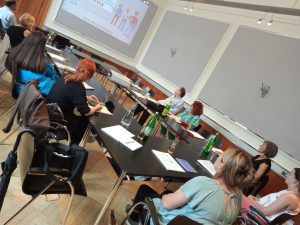 Попладнето учесниците на студиската средба имаа можност да се запознаат со работата на МЕН ВИА, организација која советува и се грижи за машките жртви на трговија со луѓе од 2013 година, преку презентација и дискусија со директорот на организацијата Манфред Бухнер. На средабат присуствуваа и Сони Шварц и Ванеса Мозер од ЕКПАТ Австрија, партнер организација во проектот. Како што беше посочено, МЕН ВИА е единствена во Австрија специјализирана за заштита на мажи жртви на трговија со луѓе, а за тоа има институционална поддршка. Како што посочи г-н Бухнер трговијата со мажи се врши во различни сектори, особено таму каде што има мала плата, а работата е опасна и нездрава: градежништво, гастрономија, чистење, земјоделство. Но, како што посочи, мажите се експлоатираат и како питачи, принудени на проституција или вршење криминални дејствија. Помошта дадена од МЕН ВИА вклучува совети, безбедно сместување, поддршка во правни, медицински, психолошки и социјални прашања и поддршка во планирањето за иднината, а околу 20 мажи годишно го користат нивниот шелтер. Бухнер присутните ги запозна и со кампањите кои ги спроведуваат за подигање на свеста и идентификување на жртвите на трговија со луѓе, како и за соработката со медиумите и судските случаи кои имале позитивна разрешница.
Попладнето учесниците на студиската средба имаа можност да се запознаат со работата на МЕН ВИА, организација која советува и се грижи за машките жртви на трговија со луѓе од 2013 година, преку презентација и дискусија со директорот на организацијата Манфред Бухнер. На средабат присуствуваа и Сони Шварц и Ванеса Мозер од ЕКПАТ Австрија, партнер организација во проектот. Како што беше посочено, МЕН ВИА е единствена во Австрија специјализирана за заштита на мажи жртви на трговија со луѓе, а за тоа има институционална поддршка. Како што посочи г-н Бухнер трговијата со мажи се врши во различни сектори, особено таму каде што има мала плата, а работата е опасна и нездрава: градежништво, гастрономија, чистење, земјоделство. Но, како што посочи, мажите се експлоатираат и како питачи, принудени на проституција или вршење криминални дејствија. Помошта дадена од МЕН ВИА вклучува совети, безбедно сместување, поддршка во правни, медицински, психолошки и социјални прашања и поддршка во планирањето за иднината, а околу 20 мажи годишно го користат нивниот шелтер. Бухнер присутните ги запозна и со кампањите кои ги спроведуваат за подигање на свеста и идентификување на жртвите на трговија со луѓе, како и за соработката со медиумите и судските случаи кои имале позитивна разрешница.
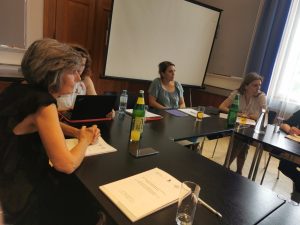 На 6 јули Маг. Харалд Фугер, аташе на Сојузното Министерство за Социјални работи, здравство, грижа и заштита на потрошувачите на Австрија направи вовед во социјалниот систем во Австрија, Заклучокот беше дека министерството вложува огромни средства за благосостојба на граѓаните, а нуди и некои посебни мерки за пензионери како рехабилитација и мерката Fit2Work, родителското отсуство, вработувањето на лица со хедикеп, кариерно советување за млади…Сепак, самокритичноста и просторот за подобрување беа посочени во некои сегменти во однос на ЕУ легислативата и примената од страна на Австрија.
На 6 јули Маг. Харалд Фугер, аташе на Сојузното Министерство за Социјални работи, здравство, грижа и заштита на потрошувачите на Австрија направи вовед во социјалниот систем во Австрија, Заклучокот беше дека министерството вложува огромни средства за благосостојба на граѓаните, а нуди и некои посебни мерки за пензионери како рехабилитација и мерката Fit2Work, родителското отсуство, вработувањето на лица со хедикеп, кариерно советување за млади…Сепак, самокритичноста и просторот за подобрување беа посочени во некои сегменти во однос на ЕУ легислативата и примената од страна на Австрија.
Попладнето беше резервирано за средба и размена на искуства со новинарите Нина Хорачек од весникот falter.at , Зоран Добриќ од телевизија ORF и Едит Мајнхарт од неделникот Profil кои беа многу заинтересирани да ги споделат своите, но и да чујат искуства за состојбата со трговија со деца во Северна Македонија. Тие генерално го делат истиот став дека социјалните теми (трговија со луѓе и деца, исчезнати деца, трудова и сексуална експлоатација) не се главни теми за медиумските куќи со објаснување дека нема доволно буџет за истражување кое овие теми обично го бараат. Тие ги споделија и искуствата во процесот на добивање информации кој најчесто е тежок и дека најголема соработка имаат со невладиниот сектор најчесто со медиуми или новинари на кои тие им веруваат. Соработката со полицијата за жал е сложена делумно и поради тоа што поголем дел од информациите се доверливи, велат тие. На средбата беше споделена и заедничката идеја за соработка и вмрежување на новинарите од двете земји, како и едукација на новинарите и поддршка за справување со траума при известување.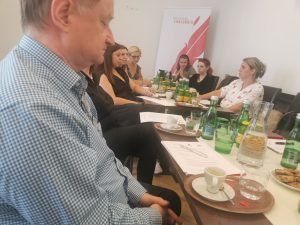
Последниот ден од студиската посета беше резервиран за две средби од кои првата со маг. Роберт Бауер од Федералното министерство за труд, дел од работната група за трговија со луѓе за трудова експлоатација. Работната група за трговија со луѓе за трудова експлоатација секои три години дава извештај за случаите кои се евидентирани во Австрија како земја 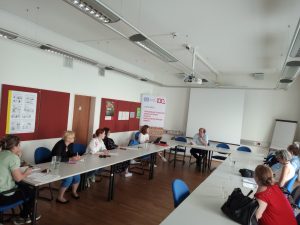 на транзит, но и земја дестинација на трговија со луѓе. Како што беше посочено на средбата најголем проблем во контролата на трудовата експлоатација има во секторот на домашна работа, домашна нега, дадилки, градежништво и земјоделие, а треба да се усвојат и бројни законски измени за да се подобри контролата во овие сектори. Интересен беше податокот дека секторот на работа на дадилки или млади девојки кои доаѓаат на културна размена – да учат јазик додека чуваат деца (au pair) има многу недостатоци во законската контрола. Бидејќи нема правна дефиниција за експлоатација туку треба да се проверуваат индикатори како лоши услови за живот, одземени документи, надминување на предвиденото работно време, ниски плати, однесување, секогаш е тешко да се открие. Најголем број од дадилките доаѓаат од источна Европа, а во 2016 од Северна Македонија имало 10-15, посочи Бауер. За присутните беше интересен и фактот дека за лица кои доаѓаат од Европската унија нема никакви податоци дека работат како дадилки па нема можност да се контролира нивниот договор за работа или работната дозвола, односно кршење на нивните права.
на транзит, но и земја дестинација на трговија со луѓе. Како што беше посочено на средбата најголем проблем во контролата на трудовата експлоатација има во секторот на домашна работа, домашна нега, дадилки, градежништво и земјоделие, а треба да се усвојат и бројни законски измени за да се подобри контролата во овие сектори. Интересен беше податокот дека секторот на работа на дадилки или млади девојки кои доаѓаат на културна размена – да учат јазик додека чуваат деца (au pair) има многу недостатоци во законската контрола. Бидејќи нема правна дефиниција за експлоатација туку треба да се проверуваат индикатори како лоши услови за живот, одземени документи, надминување на предвиденото работно време, ниски плати, однесување, секогаш е тешко да се открие. Најголем број од дадилките доаѓаат од источна Европа, а во 2016 од Северна Македонија имало 10-15, посочи Бауер. За присутните беше интересен и фактот дека за лица кои доаѓаат од Европската унија нема никакви податоци дека работат како дадилки па нема можност да се контролира нивниот договор за работа или работната дозвола, односно кршење на нивните права.
Попладневната средба беше предвидена во Дрехшаибе – Кризен центар за непридружувани малолетни странци каде на присутните Паулино Менендез, од Центарот за благосостојба на децата и младите при Град Виена ја објасни работата на кризните центри – оние кои се поделени по пол и згрижуваат деца на возраст од 15 до 18 години се 4 на територија на градот, кризните центри за деца од 4 до 15 години се станови во кои децата престојуваат со 6 педагози, додека за деца до 3 години се грижат кризни родители (лица кои поминале обука во период од 1 година). Како најниско ниво на згрижување кое постои за малолетници беа посочени дневни шелтер центри во кои се нуди итно згрижување за млади од 14 до 18 години за преноќување, а кои се обврзани да го известат центарот за благосостојба на децата и младите за секој случај.
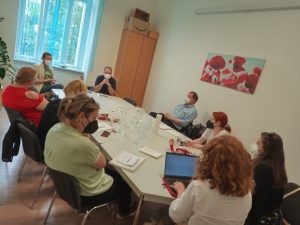 Доминик Ритер вработен во Дрехшаибе – Кризниот центар за непридружувани малолетни странци ги опиша условите во центарот во кој има место за 10-12 деца кои се сместени во одвоени соби за девојчиња и момчиња од 14 до 18 години. Тој го објасни принципот на работа со малолетниците посочувајќи дека јазикот е главна пречка во првичната комуникација кога ќе бидат донесени од полицијата или сами се пријават во центарот. За тоа постои служба од преведувачи кои ја олеснуваат комуникацијата и со онлајн превод, но давањето на сигурност на штитениците дека ништо нема да им се случи и стекнување на доверба е најважниот дел од процесот на запознавање. Тој посочи дека имаат по 10 случаи годишно на тргувани деца, иако веројатно реалниот број е многу поголем, но за жал не стигнува до нив. Повеќето се девојчиња, жртви на трговија со деца за сексуална експлоатација или џепарење. Помалку од 10 проценти од децата кои се тргувани остануваат во Виена, најчесто се враќаат дома, но процесот на ресоцијализација е тежок бидејќи во голем дел семејствата се дел од ланецот на трговија. Како што беше посочено, повеќето од нив не се идентификуваат како жртви, а главен домен на работа треба да биде стабилизација на социјалниот систем во Источна Европа за да се намали бројот на тргувани деца од овој регион.
Доминик Ритер вработен во Дрехшаибе – Кризниот центар за непридружувани малолетни странци ги опиша условите во центарот во кој има место за 10-12 деца кои се сместени во одвоени соби за девојчиња и момчиња од 14 до 18 години. Тој го објасни принципот на работа со малолетниците посочувајќи дека јазикот е главна пречка во првичната комуникација кога ќе бидат донесени од полицијата или сами се пријават во центарот. За тоа постои служба од преведувачи кои ја олеснуваат комуникацијата и со онлајн превод, но давањето на сигурност на штитениците дека ништо нема да им се случи и стекнување на доверба е најважниот дел од процесот на запознавање. Тој посочи дека имаат по 10 случаи годишно на тргувани деца, иако веројатно реалниот број е многу поголем, но за жал не стигнува до нив. Повеќето се девојчиња, жртви на трговија со деца за сексуална експлоатација или џепарење. Помалку од 10 проценти од децата кои се тргувани остануваат во Виена, најчесто се враќаат дома, но процесот на ресоцијализација е тежок бидејќи во голем дел семејствата се дел од ланецот на трговија. Како што беше посочено, повеќето од нив не се идентификуваат како жртви, а главен домен на работа треба да биде стабилизација на социјалниот систем во Источна Европа за да се намали бројот на тргувани деца од овој регион.

